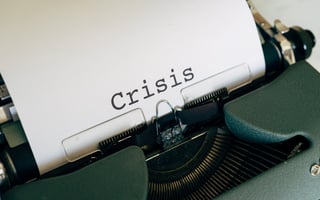There was a time when business and political activism were separate.
This time of year used to be known as silly season.
A six-week period when news would take a well-earned holiday and be replaced by obscure stories unlikely to be covered at any other time.
While the current news agenda is far from ‘silly’, the term sprang to mind when my attention was captured by yet another brand caught up in a social media pile-on.
Costa Coffee faced calls for a boycott after anti-vaxxers began sharing a picture of the ‘eat-in requirements’ at one of the chain’s branches in Ireland.
The rules included “proof of immunity” – either the EU’s Digital Covid Certificate, a vaccination card from Ireland’s Health Service Executive, or proof people had recovered from the virus.
Unvaccinated customers could sit outside and use takeaway cups.
The fact that this was the vaccination policy in a different country didn’t stop Costa from facing a significant backlash on social media in the UK.
The irony of boycotting something you thought you were banned from seemed lost on those venting their anger on social media.
Nevertheless, #boycottcosta trended at times.
I love to see it. #BoycottCosta for good. @CostaCoffee
— Laurence Fox ✌🏼🇬🇧✌🏼 (@LozzaFox) July 30, 2021
Tolerate everything but intolerance.
Name, shame and avoid any establishment which discriminates against anyone for exercising their right to bodily autonomy.#NoVaccinePassportsAnywhere #NoVaccinePassport pic.twitter.com/HDICgWFiYY
Another organisation finding itself in a social media storm lately – albeit for different reasons – is Sainsbury’s.
The supermarket has been at the centre of a campaign by pressure group Led By Donkeys to end its advertising on the GB News channel.
The group says the chain is “paying” for Nigel Farage to criticise the Royal National Lifeboat Institution on his show broadcast by the channel – he recently accused the charity of being a “taxi service” for migrants.
Led By Donkeys has used billboards to highlight the companies it says pay for Farage’s show. But much of the associated social media activity seems to be targeted at Sainsbury’s.
And it has triggered plenty of responses from people vowing not to spend their money in the store until the advertising campaign ends.
20 years at Sainsbury’s. You should know better!
— Tom Widdicombe (@tom909) August 2, 2021
I’m off to Waitrose today. I’ll be back when you sort it out.
But these are just a couple of examples. It feels that rarely a day passes without an organisation facing calls for them to be cold-shouldered.
So, how should your organisation respond if it finds itself in this situation? Here are some tips from our social media training and crisis communication training.
Do you need to respond?
The starting point is to carefully consider whether you need to respond to calls for a boycott.
Are those vowing not to use your service or buy your products again likely to be genuine upset customers? Or are they people jumping on the latest bandwagon?
These protests rarely last, and it tends not to take long for attention to fizzle and move on to the next target in line.
And, there is a big difference between promising not to buy from someone again and sticking to what you said in the real world and breaking shopping and eating habits. If Sainsbury’s is your nearest supermarket, would you travel further afield to avoid shopping there?
The impact on the till could be marginal.
The greater risk may be to reputation, especially if the story captures the attention of mainstream media.
This will partly depend on what has caused the boycott. If you have done something wrong, then that is more likely to capture the attention of journalists.
But if we look at the examples we have used in this blog, the only coverage of the Costa Coffee protest has been making fun of anti-vaxxers.
And the coverage of the Led By Donkeys protest has been largely limited to trade publications.
So, depending on what has caused the social media storm, it may be worth waiting for it to blow over.
Costa has only responded directly to a few of those threatening a boycott, and Sainsbury’s remained resolutely silent on the issue until the weekend when a vague statement saying "our latest multi-channel TV campaign" has ended. It added that a "very small number of ads" had appeared on GB News.
But a word of caution here. One of the intriguing aspects of the Led By Donkeys campaign is it kept a record of how long it took Sainsbury’s to respond and how many tweets it posted about other things in the meantime.
It seems that those behind some of these boycotts are wising up to the ‘let it blow over’ tactic.
Organised
And that leads on to another point. Some boycotts will be more effective than others.
One of the decisive factors can be how well organised it is.
Is the boycott being led by angry and frustrated individuals? Or is there a group behind it?
The involvement of Led By Donkeys added some coordination to the Sainsbury’s protest, and that created longevity.
And, you don’t want calls for social media boycotts to linger.
Action
We’ve said one approach is to let the boycott calls blow over.
But there are some situations where you will need to respond, particularly if it is obvious you have done something wrong.
And, in these situations, normal crisis communication rules apply.
You need to respond quickly – don’t allow the calls for a boycott to build up and gain momentum.
Apologise early, make it look like you mean it (or, better still actually mean it - Ed), and show what action you are taking to ensure it does not happen again.
If you decide to respond to every individual tweet – and some brands do – avoid the copy and paste approach. Factor some flexibility into your messages so you don’t sound robotic.
Have a plan
Like other areas of crisis media management, it is vital to have a plan and ensure you know what you are doing if and when you face calls for a boycott.
You might think ‘this won’t happen to us’, particularly if you are a smaller organisation. And it is easy to understand that thinking when we have focused on the household names of Sainsbury’s and Costa Coffee in this blog.
But boycott calls can affect organisations of all sizes.
I can remember, for example, family-owned sausage company Heck facing a significant backlash a couple of years ago. What caused offence? A visit from Boris Johnson as part of his campaign for the Conservative party leadership.
And it was a backlash the company appeared poorly prepared for, remaining silent before eventually issuing a rambling, muddled response.
Identify
Part of the planning should involve identifying what could cause a social media pile-on. What are your risks?
This is tricky because we live in an era of instant outrage. And the UK population remains fractured on significant issues.
You could just as easily find yourself accused of ‘funding hate’ as you could of being ‘woke’.
But it is crucial comms teams spend time on this.
And, remember, a risk area could just as easily be a topic you are not talking about as one you are.
You could be called out for staying silent on current issues and controversies. Silence can be viewed as being complicit, particularly if an issue is seen as relevant to your brand.
Monitor
If your organisation monitors social media effectively, then your social media manager is likely to become the first person to become aware of a boycott.
The quicker an organisation becomes aware of the protests, the sooner it can decide whether to respond and if crisis plans need to be activated.
So, make sure that you are working closely with the social media team and that they understand what the media team considers to be key risks.
Check
When your organisation is in the social media firing line, it is crucial to remember those who manage the accounts are in the frontline.
It can be a bruising, relentless time, potentially lasting several days.
So, check in on your social media teams and how they are coping. And, as part of your planning, consider the support you can offer and any steps you could take to ease the pressure.
Media First are media and communications training specialists with over 30 years of experience. We have a team of trainers, each with decades of experience working as journalists, presenters, communications coaches and media trainers.
Subscribe here to be among the first to receive our blogs.




